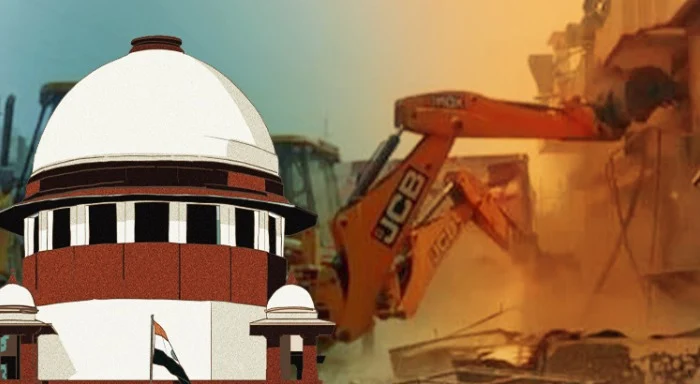Legal experts and human rights advocates have raised serious concerns over the growing culture of ‘bulldozer justice,’ a term used to describe the extrajudicial use of force, often involving the demolition of properties without due legal process. This controversial approach, which has gained momentum in India, is being criticised for undermining the rule of law, violating constitutional principles, and eroding public trust in legal institutions.
‘Bulldozer justice’ typically bypasses established legal procedures, challenging fundamental legal principles and constitutional integrity. Experts argue that this practice, which often ignores the principle of due process, compromises fairness of the judicial system. Due process, a cornerstone of constitutional law, ensures that no individual is deprived of life, liberty, or property without a fair and impartial legal process.
International human rights standards also emphasize fair legal processes and protections against arbitrary actions. Bulldozer justice can violate these standards, potentially leading to condemnation by international bodies and impacting a country’s global reputation.
Senior Supreme Court lawyer Colin Gonsalves has been vocal about the unconstitutionality of this practice. He said, “Bulldozer Justice is totally unconstitutional because the Supreme Court has said in at least five major judgments that the right to housing is a fundamental right. What the judges these days are saying on housing rights is astonishing and shocking because they are calling the poor encroachers. In International law the term ‘encroachers’ are used for people with property who take other people’s property. It is never used for the destitute who have no place to go but to live on pavements or in open spaces of public land.”
Gonsalves further highlights the international legal framework, referencing United Nations guidelines against forced evictions, particularly those affecting impoverished individuals. He laments the scale of demolitions currently taking place in India, drawing parallels to apartheid-era South Africa. “Bulldozer Raj,” he asserts, represents the rise of fascism in India, with the judiciary’s once-vigorous defence of the poor now fading.
Another senior SC lawyer Sanjay Hegde said, “There is no law that permits bulldozers as reprisal for any crime. If any construction is illegal, it can only be demolished after giving due notice and allowing the constructor to legalise it or remove the illegality himself. Demolition by the state can only be a last resort. Bulldozer justice is the demolition of the rule of law.”
Venkatesh Nayak, Director of the Commonwealth Human Rights Initiative, notes the alarming increase in incidents where municipal authorities, often under government direction, have demolished properties, particularly targeting minority communities or individuals involved in protests. Nayak criticises the arbitrary nature of these actions, pointing out that they violate fundamental rights and constitutional safeguards. He also underscores the hypocrisy in the state’s approach, where illegal constructions are bulldozed while corrupt officials responsible for such irregularities remain unpunished.
Nayak said, “Such actions are arbitrary and violative of fundamental rights and other constitutional safeguards. The right to shelter has been recognised as an essential component of the right to life by the Supreme Court in Chameli Singh vs State of UP (1996) and in this, interpretation of Article 21 of the Constitution has been reiterated by the same court and High Courts in numerous cases. The State is bound by the rule of law guaranteed under Article 14 of the Constitution and must not feel compelled to act in a vengeful manner.”
Nayak warns that this trend not only defies India’s constitutional values but also contradicts the nation’s civilisational ethos, which the current government claims to uphold. He calls for a return to humane governance, arguing that true progress towards becoming a US$ 5 trillion economy cannot be achieved by trampling on the rights of the vulnerable.


